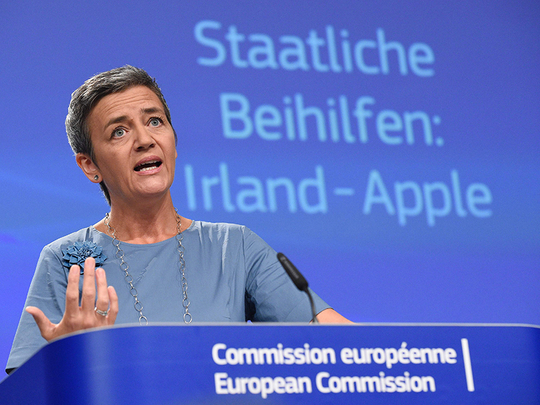
BRUSSELS/DUBLIN: The European Commission ordered Apple Inc. to pay Ireland unpaid taxes of up to 13 billion euros ($14.5 billion) on Tuesday as it ruled the firm had received illegal state aid.
Apple and Dublin said the US company’s tax treatment was in line with Irish and European Union law and they would appeal the ruling, which is part of a drive against what the EU says are sweetheart tax deals that usually smaller states in the bloc offer multinational companies to lure jobs and investment.
Apple said it was confident of winning an appeal.
“The European Commission has launched an effort to rewrite Apple’s history in Europe, ignore Ireland’s tax laws and upend the international tax system in the process,” CEO Tim Cook said in a letter to customers posted on Apple’s website. “A company’s profits should be taxed in the country where the value is created,” he added.
Ireland has “no choice” but to appeal against a European Union ruling demanding that US tech giant Apple repay them a record 13 billion euros ($14.3 billion) in back taxes, the government said Tuesday. Irish Finance Minister Michael Noonan said he profoundly disagreed with the decision and in order to preserve Ireland’s attractiveness for investment he would appeal. “The decision leaves me with no choice but to seek cabinet approval to appeal the decision before the European Courts. There is no economic basis for this decision. It’s bizarre and it’s an exercise in politics by the Competition Commission,” Noonan said. “They don’t have responsibility for taxes and they are opening a back door through state aid to influence tax policy in European countries when the European treaties say tax policy is a matter for sovereign governments,” he added.
The US feels its firms are being targeted by the EU and a US Treasury spokesperson warned the move threatens to undermine US investment in Europe and “the important spirit of economic partnership between the US and the EU”.
Starbucks Corp has been ordered to pay up to 30 million euros ($33 million) to the Dutch state, while Amazon.com Inc and McDonald’s Corp are also under investigation by the Commission, the EU’s executive arm.
EU Competition Commissioner Margrethe Vestager questioned how anyone might think an arrangement that allowed Apple to pay a tax rate of 0.005 per cent, as Apple’s main Irish unit did in 2014, was fair.
“Tax rulings granted by Ireland have artificially reduced Apple’s tax burden for over two decades, in breach of the EU state aid rules. Apple now has to repay the benefits,” Vestager told a news conference.
Analysts said the size of the claim underlined the Commission’s aggressive stance, but since each case involves different circumstances and tax rules, lawyers said it was hard to see if further big claims were any more or less likely.
Apple, which had more than $200 billion in cash and readily marketable securities at the end of June, is likely to see the case drag out for years in EU and possibly Irish courts.
The EU said Apple had benefited from a series of Irish sweetheart tax deals that were illegal.
For many technology firms like Google and Facebook, a key attraction is that Ireland allows companies to adopt tax structures which see them pay much less than the 12.5 per cent headline rate. The companies say they follow all tax rules.
Apple shares lose a little shine after EU tax bill
LONDON: Apple shares lost some of their shine on Tuesday after the European Union ordered the US tech giant to pay a record 13 billion euros ($14.5 billion) in back taxes in Ireland. Shares in the iPhone and iPad maker fell 0.4 per cent after the European Commission concluded that Dublin had shown preferential treatment to the California tech giant.
Including this morning’s loss, shares in the company had fallen 3.3 per cent in the two weeks ahead of the widely-anticipated decision.
ETX Capital analyst Neil Wilson said investors were fretting over the longer term implications rather than the size of the fine.
“For Apple and others like it, this could be a watershed,” Wilson added.
-AFP












